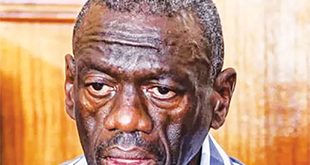
By Henry Zakumumpa
Before this African literary great, many thought that white men were the ‘owners of words’
It has been a tragic year for African literature thus far. First it was Francis Imbuga. The Kenyan dramatist of the Betrayal in the City fame succumbed to a stroke in Nairobi last November.
Francis Imbuga’s Betrayal in the City is a 1976 satire about disillusionment with post-independence Africa. It is a tale of corruption, maladministration, political thuggery, mass poverty and social exclusion told through a fictional account of a country called Kafira. It was a set play for my O’ level literature in English.
Then on March 21 Chinua Achebe, that behemoth of the iroko tree fell to a thundering thud that was felt around the world. Two of Chinua Achebe’s novels, No longer at ease and Arrow of God, were set books in my literature in English classes at `A’ level.

In many ways the passing of these African literary giants forebodes a generational transition of post-independence ‘African writers of English expression’.
As many of the ‘grandfathers of African literature’ age and many pass on, I feel a responsibility to applaud African writers who reclaimed the telling of the African discourse. They restored our faith in the ability of the African people to tell their own story, a discourse hijacked from them by aliens with imperial ambitions. They told a story of Africa by Africans, for Africans- and non-Africans alike.
In a foreword for Richard Bowden’s Africa: Altered States, ordinary Miracles, Chinua Achebe wrote: “The writer is often faced with two choices: turn away from the reality of Africa’s intimidating complexity or conquer the mystery of Africa by recognising the humanity of African people”.
In nursery school we recited ‘Pussy, pussy cat where have you been’, sang ‘Jack and Jill’, ‘ba ba black sheep’ and laughed at ‘humpty dumpty.
As a child growing up, my father brought home countless abridged works of English literature. Works that included the illustrious names like Charles Dickens, George Orwell, William Shakespeare, Thomas Hardy, and Jane Austen.
Later on at Namilyango Junior Boys’ School, Robert Stevenson’s Treasure Island was required reading by the late Mr. Mayanja, my primary four English class teacher.
For a while I thought that English was only a white man’s language and so was imagination and thought. That white men were the ‘owners of words’ to use an Achebe expression. We saw the world from English lenses even when we were black Africans resident on this native of continents. No wonder many children in our primary schools still feel strangers in their own skins.
Then at secondary school we were introduced to Chinua Achebe’s No longer at ease, Wole Soyinka’s The trials of Brother Jero and Okot P’ Bitek’s Song of Lawino and Song of Ocol .
Suddenly, literature in English was no longer the preserve of the white man. Alas, Africans could be writers too! We read African stories with African protagonists, African names, African idioms and proverbs and English written with an African accent.
African culture was no longer a dirty word. The African existence was told with understanding and empathy. It was a process of re-africanisation after years of de-Africanisation. And credit here goes to Ugandan education curriculum authorities of the time. They helped restore our self-esteem as a people and re-kindled a new belief in the ability of the ‘native tribes’.
Works like Chinua Achebe’ Arrow of God, beyond being works of literature, have a critical anthropological value. For some of the richest collection of African proverbs and idioms you need not look elsewhere. Chinua Achebe later recounted that these he owed mostly from his own grandmother.
It is a shame that the African literary scene is not as vibrant as it once was in the 1960s and that the Chinua Achebes, the Wole Soyinkas, the Ngugi Wa Thiongos, the David Rubadiris, have not found many worthy successors although a few names such as Chimamanda Ngozi Adichie seem to suggest it is not all a hopeless cause.
It is an even worse shame that the post-independence disillusionment and hopelessness that post-independence African writers wrote about has not abated. Have we turned the corner after the ‘wrong turn’ that most of Africa took in the 1960s? That’s material for the next breed of African literary greats.
 The Independent Uganda: You get the Truth we Pay the Price
The Independent Uganda: You get the Truth we Pay the Price


